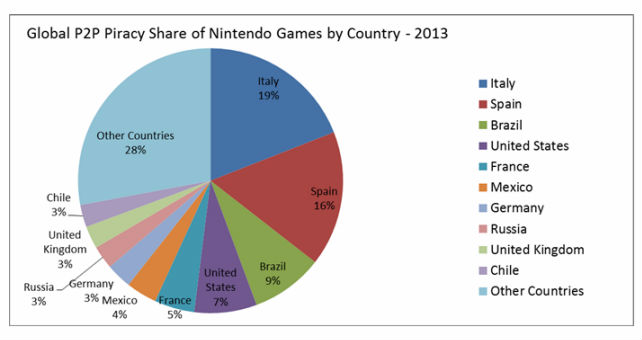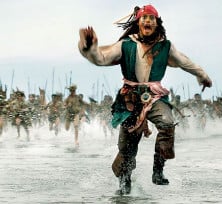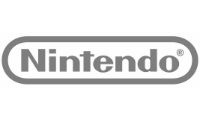TorrentFreak Email Update |
- Australian Government Signals Online Piracy Crackdown
- Nintendo Wants to Block Pirate Websites and Punish Game Pirates
- Hyperlinking is Not Copyright Infringement, EU Court Rules
| Australian Government Signals Online Piracy Crackdown Posted: 14 Feb 2014 01:29 AM PST
It’s fairly ironic then, that in the early moments of his speech to the Australian Digital Alliance forum in Canberra this morning, Attorney-General George Brandis cited the piracy difficulties encountered by Charles Dickens. “One of Charles Dickens's reasons for travelling to the United States …in 1842, was to advocate for copyright law reform. Dickens was acutely aware of how much money he was losing because his works were being pirated, at the time legally, under American copyright law which permitted publishers to reprint British books at will,” Brandis said, underlining his point that creators should be paid for their work. Of course, times have changed, and in the 21st century the United States is now keen for all other countries to adopt a specific set of copyright-protecting legal mechanisms, even though it has yet to formally bake any of them into its own legal system. This morning Brandis gave clearest indication yet of what Australians have to look forward to. “I believe in strong protections and enforcement mechanisms in support of Australia's creative industries, but, as I indicated, I am also keen, as one of the achievements in the first – term of the Abbott Government, to modernize, reform and contemporize the Copyright Act,” Brandis said. First up, Section 101 of the Act, which states that an entity which authorizes the copyright infringing activities of others can be held liable for those infringements. The famous Hollywood vs iiNet case, in which the studios tried and failed to hold the ISP liable for the infringements of its subscribers, showed that the law couldn’t be stretched as far as the studios would’ve liked. According to Brandis though, things will change. "The government will be considering possible mechanisms to provide a 'legal incentive' for an Internet service provider to cooperate with copyright owners in preventing infringement on their systems and networks," he said. “This may include looking carefully at the merits of a scheme whereby ISPs are required to issue graduated warnings to consumers who are using websites to facilitate piracy.” While Hollywood successfully implemented its “six strikes” system in the United States, none of that was forced upon ISPs by law. And here’s another US ideal (that hasn’t been implemented locally) that the Aussies appear keen to take on board – site blocking. “Another option that some stakeholders have raised with me is to provide the Federal Court with explicit powers to provide for third party injunctions against ISPs, which will ultimately require ISPs to 'take down' websites hosting infringing content,” Brandis said. But while the Attorney General referred to legal options for three strikes, disconnections and website blocking, he noted that his preference “would be to facilitate industry self-regulation, as opposed to active and continuing government regulation.” That, however, hasn’t worked to date, with discussions between Hollywood and the ISPs failing to reach any workable agreement, with the former wanting the reluctant latter to pick up the bill for enforcement. While it remains to be seen whether change is arrived at through voluntary agreement or legislation, the Australian government keen to deal with the online piracy issue once and for all, despite the effectiveness of three strikes and site blocking regimes being continually called into doubt. Photo: Dan Zen Source: TorrentFreak, for the latest info on copyright, file-sharing and VPN services. |
| Nintendo Wants to Block Pirate Websites and Punish Game Pirates Posted: 13 Feb 2014 12:52 PM PST
The review is published annually and highlights countries that in the eyes of the U.S. are not doing enough to deter copyright infringement. Nintendo is one of the companies to submit recommendations on how other countries should tackle these issues. The gaming company states that piracy is a chronic problem that results in “huge losses,” in part due to the inactivity of foreign countries who do very little to curb copyright infringement. “In the past few years, the scope of online piracy for Nintendo has grown dramatically. Every month tens of thousands of illegal Nintendo game files are detected on the Internet. The legal environment to limit the flow of these files remains extremely challenging,” the company explains in its letter. Like last year, Nintendo’s letter focuses on four countries – Brazil, China, Mexico and Spain – where these challenges remain unaddressed. For each of the countries the game company offers a set of recommendations on how the legal climate can be improved, hoping the United States Government will push for change. According to statistics presented in the letter, no less than 16% of all online piracy of Nintendo products traces back to Spain. With 1.2 million downloads this is the second largest piracy market, just behind Italy with 1.4 million downloads.  While the volume of piracy has deceased somewhat compared to previous years, Nintendo wants Spain to take drastic action. Specifically, it points out that the local Intellectual Property Committee (IPC) should block pirate sites wherever possible. “Since so many illegal video games are downloaded in Spain from foreign-based cyberlockers, and accessed through cyberlinkers or P2P linking sites hosted outside Spain, the IPC must address this issue by authorizing the blocking of linking sites,” Nintendo writes. The irony of this suggestion is that Nintendo has made no efforts in the United States to have any of the major torrent or linking sites blocked. This is especially painful because their own research shows that many of the larger Spanish linking sites are hosted in America, and registered though U.S. companies. In addition to blocking websites, the game company wants the U.S. Government to educate and train the Spanish on how to deal with copyright infringers effectively. “The Spanish Government should work with the U.S. Government and rights holders to provide necessary IP training to Spanish prosecutors, judges and IPC officials, particularly focusing on Internet piracy and effective online investigation, prosecution, and adjudication of criminal copyright infringement on the Internet.” Similar recommendations are made for Mexico, Brazil and China. In these countries Nintendo also wants ISPs to be held liable for their role in continuing high levels of Internet piracy. The gaming company says that this can be achieved by introducing notice and takedown procedures as well as stiffer penalties for companies that fail to take responsibility. “Hold Internet Service Providers responsible for facilitating piracy under certain circumstances, including a requirement that ISPs expeditiously remove infringing content when notified by a rights holder representative,” Nintendo advises for Brazil. Companies and individuals who continue to facilitate copyright infringement have to be prosecuted, Nintendo says, and to boost deterrence maximum penalties should be increased. “Bring criminal prosecutions against major infringers, including those facilitating piracy on the Internet. The courts must impose stronger penalties against IP crimes, both traditional forms of piracy and online piracy, to raise awareness and foster deterrence,” Nintendo adds. It is clear that Nintendo wants the U.S. to put more pressure on foreign countries, but whether these efforts will be successful has yet to be seen. In a few weeks the U.S. Trade Representative is expected to release its full Special 301 report. Source: TorrentFreak, for the latest info on copyright, file-sharing and VPN services. |
| Hyperlinking is Not Copyright Infringement, EU Court Rules Posted: 13 Feb 2014 06:44 AM PST
One of the key roles of the EU’s Court of Justice is to examine and interpret EU legislation to ensure its uniform application across all of those member states. The Court is also called upon by national courts to clarify finer points of EU law to progress local cases with Europe-wide implications. One such case, referred to the CJEU by Sweden's Court of Appeal, is of particular interest to Internet users as it concerns the very mechanism that holds the web together. The dispute centers on a company called Retriever Sverige AB, an Internet-based subscription service that indexes links to articles that can be found elsewhere online for free. The problem came when Retriever published links to articles published on a newspaper’s website that were written by Swedish journalists. The company felt that it did not have to compensate the journalists for simply linking to their articles, nor did it believe that embedding them within its site amounted to copyright infringement. The journalists, on the other hand, felt that by linking to their articles Retriever had “communicated” their works to the public without permission. In the belief they should be paid, the journalists took their case to the Stockholm District Court. They lost their case in 2010 and decided to take the case to appeal. From there the Svea Court of Appeal sought advice from the EU Court. Today the Court of Justice published its lengthy decision and it’s largely good news for the Internet. “In the circumstances of this case, it must be observed that making available the works concerned by means of a clickable link, such as that in the main proceedings, does not lead to the works in question being communicated to a new public,” the Court writes. “The public targeted by the initial communication consisted of all potential visitors to the site concerned, since, given that access to the works on that site was not subject to any restrictive measures, all Internet users could therefore have free access to them,” it adds. “Therefore, since there is no new public, the authorization of the copyright holders is not required for a communication to the public such as that in the main proceedings.” However, the ruling also makes it clear that while publishing a link to freely available content does not amount to infringement, there are circumstances where that would not be the case. “Where a clickable link makes it possible for users of the site on which that link appears to circumvent restrictions put in place by the site on which the protected work appears in order to restrict public access to that work to the latter site's subscribers only, and the link accordingly constitutes an intervention without which those users would not be able to access the works transmitted, all those users must be deemed to be a new public,” the Court writes. So, in basic layman’s terms, if content is already freely available after being legally published and isn’t already subject to restrictions such as a subscription or pay wall, linking to or embedding that content does not communicate it to a new audience and is therefore not a breach of EU law. The decision, which concurs with the opinions of a panel of scholars, appears to be good news for anyone who wants to embed a YouTube video in their blog or Facebook page, but bad news for certain collecting societies who feel that embedding should result in the payment of a licensing fee. Source: TorrentFreak, for the latest info on copyright, file-sharing and VPN services. |
| You are subscribed to email updates from TorrentFreak To stop receiving these emails, you may unsubscribe now. | Email delivery powered by Google |
| Google Inc., 20 West Kinzie, Chicago IL USA 60610 | |


 The European Union has been expanding since its creation in the 1950s and is now comprised of 28 member states, each committed to EU law.
The European Union has been expanding since its creation in the 1950s and is now comprised of 28 member states, each committed to EU law.